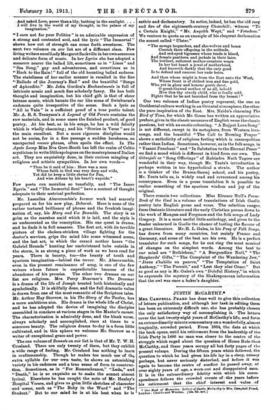JUSTIN Mc C.ARTHY.*
Mas. CAMPBELL PRAED has done well to give this collection of letters publication, and although her taskin editing them has been an extremely difficult one, she has probably chosen the only satisfactory way of accomplishing it. The letters cover the last twenty-eight years of McCarthy's life, and form an extraordinarily minute commentary on a woriderf idly, al most tragically, crowded period. From 1884, the date at which the book opens, until his retirement from the leadership of the Irish Party in 1896 no man was closer to the centre of the struggle which raged about the question of Home Rule than McCarthy, and these years occupy all but forty pages of the present volume. During the fifteen years which followed, the question to which he had given his-life lay in a. sleep, uneasy perhaps, but never seriously disturbed, and before- it was again to become the centre of conflict he passed away, at over eighty years of age, a worn-out and disappointed man. It is in- the extraordinary fidelity with which his corre- spondence follows the crowded events of the years before his retirement • that the chief interest and -value . of • Out Book of Memories: Letters of letstim McCarthy to We. Campbell Praia. London : Chatto and Winclus, [12s. 6d. net.] the collection lie. McCarthy must have had an almost miraculous facility in letter-writing. Sometimes he dashes off a line on the platform of a meeting, sometimes from his seat in the House under the very shadow of the tall, tragic figure of Parnell who has just risen to speak, sometimes in the division lobby, with the aged Gladstone sitting next him "scratching a letter with all the energy of a young man writing to his sweetheart." The result is that we are brought extraordinarily close to the events described. McCarthy's epistolary style is marked rather by a fluent if somewhat conventional ease than by any very vivid force of personality. Moreover his correspondence does not throw any really new light on the story of these eventful years. The negotiations which attended the introduction and passage of the Bills of 1886 and 1892, the cataclysm which followed Gladstone's determined stand on the Parnell divorce question, the divi- sions which harassed and destroyed the Irish Party; have all been fully described in recent political biographies. Here we have little more than confirmation of an already established tradition. But the record is faithful and vivid. McCarthy was of course a partisan (his personal devotion to Parnell survived even the political split which threw the two men into opposi- tion), but whatever one's own view on the questions involved may be, one cannot help recognizing his absolute sincerity.
The correspondence is not confined to political subjects. McCarthy's heart was really not in politics but in literature, and in spite of his devotion to the cause he had chosen he seems always to have been haunted by the thought that he was really misapplying his energies. Before he entered Parliament he had won a position in English literary society by his History of Our Own Time, a book, for all its faults, still without a serious rival, and it was this position that gave his political services so much value. He was a tremendous worker and a great diner-out. Even when his work in the House was most exacting he continued writing leaders for the Daily News, lecturing on subjects both literary and political, writing articles, novels, and stories both by himself and in collabora- tion with Mrs. Campbell Praed, or attending political banquets, the tea and dinner tables of Upper Bohemia, "first nights" and theatrical supper parties. All these activities are reflected in the letters, but the political interest remains the chief one. The "fatal facility," the dangers of which he himself recognized, enabled him to accomplish prodigies of labour, but it marred his work both in history and literature, and to a great extent it spoils his letters. Leisure is essential to good letter-writing, and leisure was unknown to McCarthy during the years of his maturity. His energies were too dispersed, his mind too variously occupied to allow of deep thought or deeply personal expression. It was this fault which made Mrs. Praed's task so difficult. The level of the letters is so even that selection became almost impossible, and Mrs. Praed has evidently found the task beyond her. If the result is occasional monotony, an experienced reader is never without his remedy.











































 Previous page
Previous page